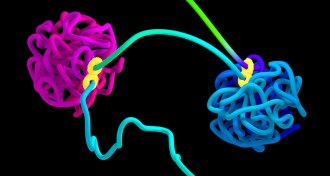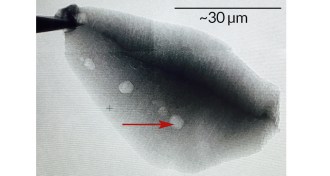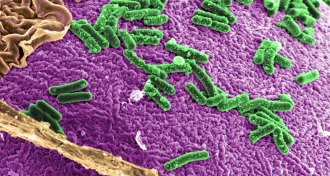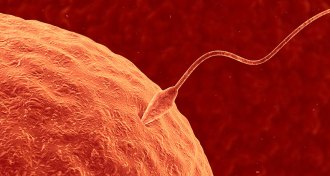News in Brief
-
 Neuroscience
NeuroscienceSex influences ability to assess crowd’s emotion
New analyses explain how people detect an angry mob or a happy party.
-
 Neuroscience
NeuroscienceHigh-fat diet’s negative effect on memory may fade
Brain may find way to compensate for memory impairments linked to high-fat diets, study in rats shows.
By Susan Gaidos -
 Paleontology
Paleontology300 million-year-old giant shark swam the Texas seas
Fossil find shows oldest known ‘supershark,’ about the size of a limo, prowled the ocean 300 million years ago.
By Meghan Rosen -
 Neuroscience
NeuroscienceMultitaskers do worse on tasks that require focus
Multitasking is more likely to impair teens’ focusing ability than improve it, study testing attention skills finds.
By Susan Gaidos -
 Life
LifeGenetic tweaks manipulate DNA’s loops
Scientists have changed the loops and curls of DNA as it packs into a nucleus.
-
 Earth
Earth4.1-billion-year-old crystal may hold earliest signs of life
New evidence suggests that life on Earth arose before 4.1 billion years ago, 300 million years earlier than previous estimates.
-
 Humans
HumansU.S. is growing more genetically diverse
Young Americans are more genetically diverse than previous generations, a new DNA analysis reveals.
-
 Genetics
GeneticsMicrobes may reveal colon cancer mutations
Certain microbial mixes are associated with particular DNA mutations in colon cancer, a new study suggests.
-
 Health & Medicine
Health & MedicineCancer drug’s effectiveness overinflated in animal studies
Claims about the cancer drug sunitinib are overblown because of poorly designed studies and negative results that were never published, a new analysis suggests.
-
 Health & Medicine
Health & MedicineSperm protein may offer target for male contraceptive
With the identification of a new sperm protein that helps sperm penetrate eggs, researchers may be closer to developing birth control pills for men.
By Meghan Rosen -
 Life
LifeBabies low on key gut bacteria at higher risk of asthma
Asthma risk may be set early in life, but mice data suggest that the risk could altered by friendly gut bacteria.
-
 Planetary Science
Planetary ScienceSalt streaks point to present-day water flows on Mars
Salt deposits on Mars hint at contemporary seasonal water flows on the Red Planet.